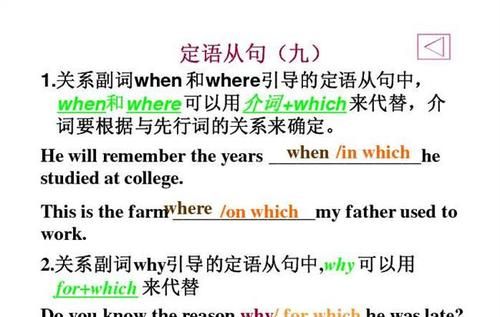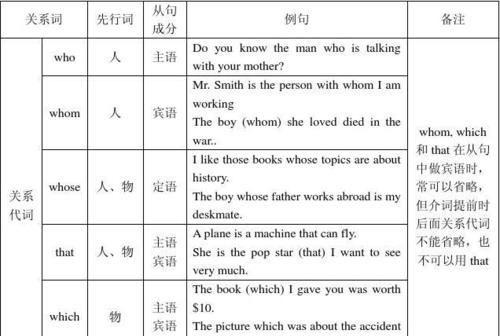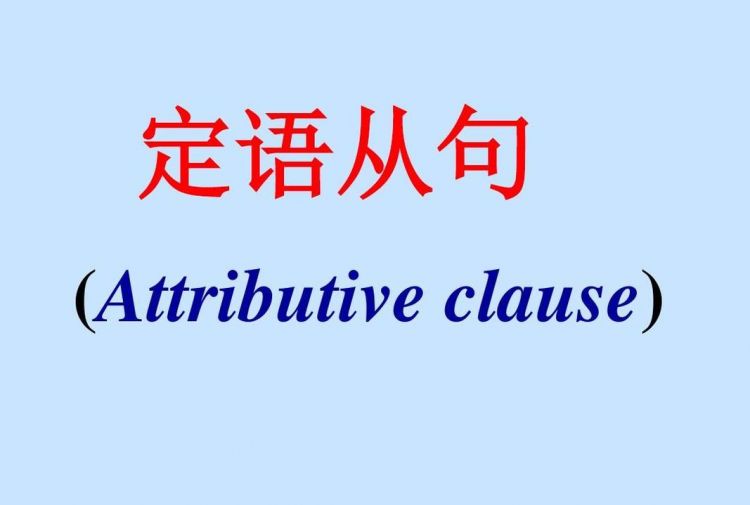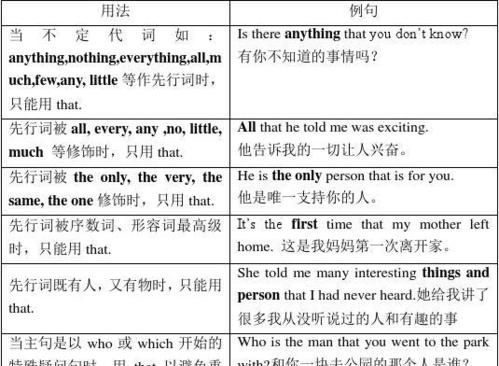本文目录
定语从句关系副词例句
定语从句,一个简单句跟在一名词或代词后(先行词)进行修饰限定,所以叫做定语从句。接下来要给大家推荐的是定语从句关系副词例句,欢迎阅读以及参考!
定语从句关系副词例句 篇1
一、基本概念:
在复合句中,修饰某一名词或代词的从句叫定语从句。如:
Do you know the man who spoke at the meeting just now?
That is the house where he lived ten years ago.
定语从句所修饰的词叫先行词;定语从句一般用关系代词或关系副词来引导,关系词放在先行词与定语从句之间起连接作用,同时又作从句中的一个成分。
引导定语从句的关系代词有:that, who, whom, whose, which;
关系副词有:when, where, why.
二、关系词的用法:
(一)关系代词的用法:
1. 作主语用who, which和that, 如:
He is the man who/that lives next door.
The train which/that has just left is for Shenzhen.
2. 作宾语用whom, who, which, that, 如:
The man (whom/who/that) we have just seen is a famous writer.
Where is the book (which/that) I bought last week?
注:在非正式文体中,用于指人的关系代词who whom, that 通常可以省略,但在正式文体中通常用whom, 不可省略;用于指物的关系代词which和that 在非正式文体中也通常省略,但在正式文体中一般不省略。
3. 作定语用whose, 如:
(a) He is the man whose car was stolen last week.
(b) It was a meeting whose importance I did not realize at that time.
注:“whose +名词中心词”这一结构在定语从句中既能作主语(如上a句),又能作宾语(如上b句)。whose 的先行词常用来指人,但有时也可以用来指具体事物或抽象概念,这时可以与of which 结构互换,词序是:“名词+of which”,如:
They came to a house whose back wall had broken down.. (= the back wall of which)
He’s written a book the name of which I’ve completely forgotten. (= whose name)
4. 作表语只用that ,它既可以指人,也可以指物,但时常省略。如:
He is no longer the man that he used to be.
This is no longer the dirty place (that) it used to be.
(二)关系副词的用法:
1.when 指时间,在从句中作时间状语,它的先行词通常有:time, day, morning, night, week, year 等。如:
I still remember the time when I first became a college student.
Do you know the date when Lincoln was born?
注:when时常可以省略,特别是在某些句型和某些时间状语中。如:
Each time he came, he did his best to help us.
But help never stopped coming from the day she fell ill.
2.where指地点,在从句中作地点状语。它的先行词通常有:place, spot, street, house, room,
city, town, country等,如:
This is the hotel where they are staying.
I forget the house where the Smiths lived.
注:where有时也可以省略。如:
This is the place (where) we met yesterday.
3. why指原因或理由,它的先行词只有reason。如:
That is the reason why he is leaving so soon.
注:why时常也可以省略。如:
That is the real reason he did it.
(三) 使用关系副词应注意下列几点:
1. 这三个关系副词在意义上都相当于一定的介词+which结构:
when = on (in, at, during…) + which;
where = in (at, on…) + which;
why = for which. 如:
I was in Beijing on the day when (=on which) he arrived.
The office where (=in which) he works is on the third floor.
This is the chief reason why (=for which) we did it.
2. 当先行词是表时间的time, day等和表地点的.place, house等时,一定要注意分析从句的结构,如果缺少主语或宾语时,关系词应该用which或that, 缺少时间状语或地点状语时,才能用when或where,试比较:
I’ll never forget the day when my hometown was liberated.
I’ll never forget the days which/that we spent together last summer.
His father works in a factory where radio parts are made.
His father works in a factory which/that makes radio parts.
3. when和where既可以引导限制性定语从句,也可以引导非限制性定语从句。而why 只能引导限制性定语从句。
定语从句关系副词例句 篇2
关系词通常有下列三个作用:1)引导定语从句;2)代替先行词;3)在定语从句中担当一个成分。
关系代词有that,which,who,whom,whose,as等;
一:关系代词的用法 关系代词 指代对象及在从句中所作的成分
使用要点
that
即指人又指物;作主语或宾语(作宾语时可省略)
只用于限制性定语从句中,介词后面不能跟that。 当代替物时,可以与which通用。
Yesterday Emily was wearing the new dress that I gave her.
昨天艾米丽穿了我送给她的新衣服。
I have a friend that likes listening to classical music我有个朋友喜欢听古典音乐。
which
指物;作主语或宾语(作宾语时可省略)
在非限定性定语从句中,只宜用which,不能用that.在限定性定语从句中,可用在介词之后。
My parents live in a house which is more than 100 years old
我的父母住在一座具有100多年历史的房子里
who,whom
指人;作主语或宾语(whom常可省略) 先行词必须为人。Who可代替在从句中担任宾语的whom,若前有介词,须用whom
A couch potato is a person who spends a lot of time watching TV. “A couch potato”指那种成天沉湎于电视中的人。
The student(whom)I taught two years ago has joined the army.
我两年前教的那个学生已经参军了。
whose 既指人又指物;作定语 是代词的所有格, 代物时,相当于of which。
The room whose window faces south is mine. 那个窗户朝南的房间是我的。
注意:whose指物时,常用of which结构来代替。如:
The classroom whose door is broken will soon be repaired.
=The classroom the door of which is broken will soon be repaired.
1.who指人,在从句中做主语
(1)The boys who are playing football are from Class One.
(2)Yesterday I helped an old man who lost his way.
2. whom指人,在定语从句中充当宾语,常可省略。
(1) Mr. Liu is the person (whom) you talked about.
注意:关系代词whom在口语和非正式语体中常用who代替,可省略。
(3) The man who/whom you met just now is my friend.
3. which指物,在定语从句中做主语或者宾语,做宾语时可省略
(1) Football is a game which is liked by most boys. ( which 在句子中做主语)
(2) This is the pen (which) he bought yesterday. ( which 在句子中做宾语)
4. that指人时,相当于who或者whom;指物时,相当于which。
在宾语从句中做主语或者宾语,做宾语时可省略。
(5) The people that/who come to visit the city are all here. (在句子中做主语)
(6) Where is the man that/whom I saw this morning? (在句子中做宾语)
5. whose通常指人,也可指物,在定语从句中做定语
(1) He has a friend whose father is a doctor.
(2) I lived in a house whose roof has fallen in.
whose指物时,常用以下结构来代替
(3)The classroom whose door is broken will soon be repaired.
=The classroom the door of which is broken will soon be repaired.
(5)Do you like the book whose color is yellow?
=Do you like the book the color of which is yellow?

修饰后置定语从句的例子
(一)后置定语从句例子
It is he who received the letter that an nounced the deat hofhis uncle.是他接到了那封信,说他的叔叔去世了。(限制性定语从句,后置省略先行词)
他们正在为一个理想而努力,这个理想是每个中国人所珍爱的,在过去,许多中国人曾为了这个理想而牺牲了自己的生命。(限制性定语从句太长,按照汉语表达习惯,后置)
They are striving for the ideal which is close to the hear to fevery Chinese and for which,in the past,many Chinese have laid down their lives.
大概100人在周六的法庭接受审判。他们被控在六月份充满争议的总统选举后引起骚乱,威胁国家安全。 结构分析:这句话的前半部分是主干。后面的是过去分词短语做后置定语,修饰people。thatfollowed……是定语从句,修饰unrest。
(二)后置定语的用法
用法1
当形容词修饰由every-、some-、any-、no-加body、one、thing等构成的复合不定代词时须后置。例如:
Have you ever met anyone famous ?
你曾经见过名人吗?
He did everything possible to help us .
他做了一切可能做的来帮助我们。
There is something wrong with the computer .
这台电脑出毛病了。
注意:若something 前面有定冠词修饰,形容词不用后置。例如:There , on the table , was the mysterious something that they had been looking for . 看,在桌子上,正是他们一直孜孜以求的神秘的东西。
用法2
形容词组作定语须后置,其功能相当于一个定语从句。例如:
_________ to take this adventure course will certainly learn a lot of useful skills .
A. Brave enough students B. Enough brave students
C. Students brave enough D. Students enough brave
答案为C,解释见后面。
They are the boyseasiest to teach .
他们是最容易教的孩子。(划线部分相当于who are easiest to teach)
The basketfull of some fruitsbelongs to the old woman .
盛满各种水果的这个篮子是这位老妇人的。(划线部分相当于which is full of some fruits )
Thosebrave enough to take the coursemust be the top students in the grade .
那些敢于选修这门课程的学生一定是本年级的尖子生。(划线部分相当于who are brave enough)
用法3
两个形容词用and 或or连接作定语,进一步说明被修饰名词的作用,此时须后置。例如:
Power stations ,large and small, have been set up all over the country .
大大小小的水电站已经在全国各地兴建起来了。
(划线部分相当于which are large and small)
Every book ,new or old, should be put in the room .
不论新书还是旧书都应该放在这个房间里。
(划线部分相当于which is new or old)
用法4
形容词else常位于不定代词或疑问代词后作定语。例如:
Anything else I can do for you ?
我能为你做些别的事情吗?
What else did they say ?
他们还说了些什么?
用法5
形容词比较等级结构修饰名词时须后置。例如:
The Smiths need a car garage twice larger than this one .
史密斯夫妇需要一个比这个大一倍的车库。
He has booked the seat farthest from the door on the train for us .
他已经为我们预定了火车上离车门最远的座位。
用法6
“基数词+表示时间或度量单位的名词+形容词”结构可用来修饰名词,起定语作用。此时,该类结构的词组须后置。例如;
Yesterday , a Mr Brown , 28 years old , came to visit you .
昨天,一位二十八岁,自称是布朗先生的人来拜访过你。
There used to be a tall building about 50 metres high .
过去,这里曾经有一座大约50米高的.大楼。
用法7
部分以a-开头的表语形容词,如:alive , alike , alone , awake 等,有时也可以作定语修饰名词。此时,须将该形容词置于被修饰的名词之后。例如:
She was the only person awake at that night .
她是那天晚上惟一一个醒着的人。
You are the happiest children alive .
你们是当代最幸福的孩子。
用法8
.形容词responsible 作“可信赖的;可靠的”解时,作前置定语;作“有责任的;应负责的”解时,须作后置定语。例如:
He is a responsible man .
他是一个可以信赖的人。
The man responsible should be their manager .
负责任的应该是他们的经理。
用法9
形容词present 作“现在的;目前的;现存的”解时,作前置定语;作“出席的;在场的”解时,须作后置定语。例如:
What is your present address ?
你现在的住址是什么?
The present international situation is excellent .
当前的国际形势一片大好。
The professors present at the meeting came from Shandong University .
出席这次会议的教授们来自山东大学。
The students present welcomed the decision .
在场的学生都欢迎那个决议。
用法10
形容词worth构成的词组作定语时,常常后置。例如:
In 1626 the island of Manhattan was bought from local Indians , Natives Americans , for a handful of goods worth $24 .
曼哈顿岛是于1626年从当地的印第安人(即美洲土著人)手中买来的,只花了价值约为24美元的为数不多的货物。
A carworth $ 80,000is not too dear for him to buy .
对他来讲,买一辆价值八万美元的车不算太贵。
(划线部分相当于which / that is worth $ 80,000)
The tall building worth 200,000 dollars in all has been sold to a foreigner .
总计达20万美元的高楼已经卖给了一位外国人。
用法11
动词不定式作后置定语表示要做的事(尚未发生),常与名词有动宾关系,不及物动词加介词。

定语从句合成句子例子
定语从句是英语里的很重要的知识,以下是专门为你收集整理的定语从句合成句子抄写,供参考阅读!
定语从句 的'英文句子
1.this is the book which i like the most.
2.the box which is full of books should be empty as soon as possible.
3. i am the one who wrote to you.
4.the teacher who teaches us maths is a young man.
5.i want to find a place where is quiet and good.
6. the restaurant where we had our lunch last time is in tha 17th street.
7.the book that you borrowed from me yesterday is helen's ,not mine.
8.the dog that is eating over there belongs to the shopkeeper.
9.i like the movie that i watched yesterday.
10.do you think the picture that is taken by john is good?
定语从句的中英文优美句子
1. 我是一个16岁的女孩,在日坛中学上学。
I’m a 16-year-old girl, who is studying in Beijing RitanHigh School.
2. 我捡起了游客扔下的垃圾。
I picked up the garbage/rubbish/litter that/which the tourists/visitorsthrew away.
3. 她是我见过的最漂亮的女孩。
She is the most beautiful girl that I have ever seen/met.
4.这就是我曾经工作过的工厂。
This is the factory that/whichI worked in.
This is the factory where I worked.
5.这就是我上周参观过的那家工厂。
This is the factory that/which I visited last week.
6.这是我读过的最有趣的小说。
This is the most interesting novel that I have ever read.
7.他将于四月访问我们学校,到时,他将给我们做一个关于如何学英语的讲座。
He is going to visit our school in April, when he will give/deliver us a lecture about how tolearn English .
8.在我们学校,有一个大图书馆,在那儿我们能够读到我们感兴趣的书。
In our school, there is a big library, where we canread the books
that/which we are interested in.
9.我昨天去了上海,那是我出生的地方。
Yesterday I went to Shanghai, where I was born.
10.他这次考试又没及格,这让他的父母很生气。
He didn’tpass/failed theexam again, which made his parents very angry.

从句例句50句
1. 哪些从句是完整的句子
that 引导的名词性从句(主从,宾从,表从,同位语从句),从句意思完整,句子完整。that只起到引导的作用,它不充当从句的句子任何成分,也没有什么的意思。在引导宾从时that 一般可以省略。引导其他名词性从句时不省略。
whether/ if引导的名词性从句,whether/ if含有“是否”之意,如果去掉whether/ if,从句的意思是不完整的,但是句子结构还是完整的。并且它不可省略。
定语从句的引导词,是有实际意义的并且在从句中充当相应的成分(主语,宾语,表语,定于,状语),
状语从句必须要连词来引导,并不能省略,从句结构完整,但是如果少了连词的意思,整个从句意思就不完整。
2. 求助100句英语句子
现在完成时 I have lost my wallet. Jane has laid the table.Michael has been ill.He has returned from abroad.Mary has been ill for three days. I have lived here since 1998. He has already obtained a scholarship. I haven't seen much of him recently (lately). We have seen that film before. Have they found the missing child yet Have you ever been to Beijing I have never heard Bunny say anything against her. I have used this pen only three times. It is still good. George has met that gentleman on several occasions. Peter has written six papers so far. Man has now learned to release energy from the nucleus of the atom. There has bee too much rain in San Francisco this year. The friendly relations and cooperation between our two countries have been enhanced in the past few years. Thomas has studied Russian.We have had four texts this semester. I have seen the book。
I have been a singer。 I have broken the glass。
I have given you a book。 I have written a story。
现在进行时He is flying a kite now. I am writing with my new pen. Listen! The girl is singing 。 She is cleaning the classroom. I'm looking for my walletMy mom is doing the housework. I'm playing computer game. Tom is eating a cake. They are washing their clothes. The dog is chasing a cat. I'm doing my homework. You're washing your coat. He's watching TV. They're waiting for the train. What's going on there? She's watering the flower. I'm playing the piano. You're having breakfast. He's working on a project. They're running. He's swimming. She's fishing. He's talking to her. We're argueing some problems. They're drawing pictures. Are you helping your friends? The trees are being planted. He's listening to the radio. My father is repairing the car. My mother is closing the door.过去完成时We have been connected with each ohter before he came here.By the end of last year, Harry had been married with Mary for 30 years. The train had left when I got to the station. Mr Green had lived in New York for ten years before he came to China.We had learned 1000 words by the end of last term.Hardly had I reached the school when the bell rang. We had hardly begun our walk when it began to rain.He looked at me as if he had seen me before. He looked dog-tired, as if he had run 5000 kilometres. She walked by with out looking at me, as if i were a stranger The tree glows badly now as if nobody had watered it. They were talking happy as if they had known each other for a long time He speaks Eniglish very well as if he come from UK. They had saved money before they got married. It's Mary who gives piano lessons everyday.By nine o'clock last night, we had got 200 pictures from the spaceshipI had been at the bus stop for 20 minutes when a bus finally cameHe said he had worked in that factory since 1949.Mr. Smith died yesterday. He had been a good friend of mine.I didn't know a thing about the verbs, for I had not studied my lesson.I returned the book that I had borrowed.She found the key that she had lostHe said that he had known her well.I thought I had sent the letter a week before. When I woke up, it had already stopped raining.She didn't go to bed until she had finished he work.After he arrived in England, Marx worked hard to improve his English.They had wanted to help but could not get there in timeWe had hoped to be able to come and see you .Hardly had he began to speak when the audience interrupted him.No sooner had he arrived than he went away againIt was the third time that he had been out of work that year过去进行时I was playing computer last night. He was looking after his little sister yesterday morning. She was reading an English book this morning. They were listening the classical music on 2:00. My sister was crying this afternoon.I was playing badminton yesterday morning. I was checking my e-mails when you called. We were watching TV when you knocked at the door. I was chatting with a friend on line when my boss walked into my office just now. He was sleeping while everybody was playing this afternoon. What were you doing at that time? They were having a meeting at 4p.m. yesterday afternoon. My little sister was swimming this time the day before yesterday. When the UFO landed,I was taking a walk. When he left,it was raining outside. When my little brother was watching TV,I as writing. Were he sleeping at that time?When my mom left home I was writing a letter to LiMing. When Mr. Yu walked into the classromm, we were reading English. When I walked into the room, my little sister was sleeping. When LiLei met Kate on the road, she was running.We were leaving the office when the telephone 。
3. 一个句子最多可以有几个从句啊
理论上讲可以有无数个.主语可以是个从句,宾语可以是个从句,状语可以带个地点状语从句,带个时间状语从句,某个名词或代词再由一个定语从句或者两个定语从句修饰……举个例子:Whoever knows me can predict what I will react to such impolite words that sound so aggresive when I am not in mood.“任何一个了解我的人都料得到,在我不高兴的时候,对于听起来如此挑衅的话,我会如何反应.”这句话是我随便写的,就包含了一个主语从句,一个宾语从句,一个定语从句,一个时间状语从句.其实从句并不难,只要你能够仔细地分析,这个从句是什么从句,跟在哪个词后面,有什么作用.要学好英语,一定要学好从句,因为,在与外国人交谈或看英语文章的时候,这种从句他们常常信手(口)拈来,不懂得从句肯定是不行的.学好从句关键是要掌握从句最基本的结构以及此从句与彼从句的区别特征在哪里.。
4. 英语各种从句的句子结构
组成句子的各个部分叫句子成分。
英语句子成分有主语,谓语,表语,宾语,宾语补足语,定语,状语等。 顺序一般是主语,谓语,宾语,宾语补足语,而表语,定语,状语的位置要根据情况而定。
1、主语 主语表示句子主要说明的人或事物,一般由名词,代词,数词,不定式等充当。 Helikeswatch'ingTV.他喜欢看电视。
2、谓语 谓语说明主语的动作,状态或特征。 一般可分为两类: 1),简单谓语 由动词(或短语动词)构成。
可以有不同的时态,语态和语气。 Westud'yforthepeo'ple.我们为人民学习。
2),复合谓语:情态动词+不定式 Icanspeakalit'tleEng'lish.我可以说一点英语。 3、表语 表语是谓语的一部分,它位于系动词如be之后,说明主语身份,特征,属性或状态。
一般由名词,代词,形容词,副词,不定式,介词短语等充当。 Mysis'terisanurse.我姐姐是护士。
4、宾语 宾语表示动作行为的对象,跟在及物动词之后,能作宾语的有名词,代词,数词,动词不定式等。 WelikeEng'lish.我们喜欢英语。
有些及物动词可以带两个宾语,往往一个指人,一个指物,指人的叫间接宾语,指物的叫直接宾语。 Hegavemesom'eink.他给了我一点墨水。
有些及物动词的宾语后面还需要有一个补足语,意思才完整,宾语和它的补足语构成复合宾语。如: Wemakehimourmon'itor.我们选他当班长。
5、定语 在句中修饰名词或代词的成分叫定语。 用作定语的主要是形容词,代词,数词,名词,副词,动词不定式,介词短语等。
形容词,代词,数词,名词等作定语时,通常放在被修饰的词前面。 Heisanewstu'dent.他是个新生。
但副词,动词不定式,介词短语等作定语时,则放在被修饰的词之后。 Thebikeintheroomismine.房间里的自行车是我的。
6、状语 修饰动词,形容词,副词以及全句的句子成分,叫做状语。用作状语的通常是副词,介词短语,不定式和从句等。
状语一般放在被修饰的词之后或放在句尾。副词作状语时可放在被修饰的词前或句首。
HelivesinLon'don.他住在伦敦。 从句是指用于复合句中担当某个句子成分的主谓结构。
虽说从句自身的句子结构是完整的, 但是它不能视为独立的句子,因为它离开了主语就无法独立、完整地表达意思。按其所能表达的意义而言,它相当于一个词或是一个词组.例如: 1) Because they talk at home while the television is on , many people think they can talk at movies as well . (状语从句)许多人在家里是边看电视边谈话,所以他们认为在电影院也可以如此。
2) Whether he comes or not doesn't make any difference to me . (主语从句) 他来与不来对我都一样。 3)There is disagreement among economists about what money is and how money is measured(宾语从句)什么是货币以及怎样计量货币经济学家之间存有分歧。
4) China is not what it used to be . (表语从句)中国不是它过去的样子了。 5) Is there any proof that the food of plant differs from that of animals ? (同位语从句)有没有什么证据说明植物性食品不同于动物性食品? 6) Taxes consist of money that people pay to support their government . (定语从句) 税款是人们支持政府而交的钱。
如果将上面的复合句中所有的从句都独立出来,那将是这样的: 1) Because they talk at home while the television is on 2) Whether he comes or not 3) what money is and how money is measured 4) what it used to be 5) that the food of plant differs from that of animals 6) that people pay to support their government 我们很容易看出,上面的所有这些句子既不是陈述句、疑问句,也不是祁使句,更不是感叹句。也就是说,它们不是独立的句子;也只有在附属于主句后才能获得意义如下:1)因为许多人在家里是边看电视边谈话 2)他来与不来 3)什么是货币以及怎样计量货币 4)它过去的样子5)植物性食品不同于动物性食品6)人们支持政府而交的上面的这些句子在我们中文里如同是人们常说的"半截话";在英文中也就是个"词或词组"了。
B. 我们虽然说过,从句自身的句子结构基本是完整的,但是它不同于"独立句子"的是--每个从句的最前面都好象"戴了顶帽子"即:从属关系词。由此可以看出,从句的另一个特点是:从属关系词总是立于从句之首. C. 从句的再一个特点是:一般说来(除少数倒装的情况外),从句中的语序应该是正常语序。
D. 关于从句种类的划分有两种方法:按从句的词性划分和按从句的句子功能划分。如果按从句的词性划分,从句可分为三种:名词从句、形容词从句和副词从句。
如果按从句的句子功能划分(也就是按从句在句子中所担任的成分来划分),从句可分为:主语从句、宾语从句、表语从句、同位语从句、定语从句和状语从句。其实,这两种划分从句的方法在逻辑上是一致的.我们知道,能在句子里充当主语、宾语、表语和同位语的往往是名词、代词等,所以名词从句涵盖了主语从句、宾语从句、表语从句和同位语从句。
形容词和副词常分别在句中担当定语和状语,所以,形容词从句和副词从句其实分别是定语从句和状语从句。 名词从句名词从句在句中是一个相当于。
5. 求个句子求一个含5个从句的句子顺便解释下,谢谢不要有太多太难 爱
When I got there, I found that what I had expected to know disappeared completely as the policemen had scattered the crowd as they were ordered. 1,When I got there时间状语从句。
2,that引导一个宾语从句。 3,what I had expected to know 宾语从句中的主语从句。
4,第一个as引导一个原因状语从句。 5,第二个as引导一个方式状语从句。
后三个从句都是宾语从句中从句。
6. 什么是从句.什么是短语如题
我说说我自己的理解:一般情况下,一个句子由主,谓,宾,定,状,补语等成分构成.但对于其中的主语,宾语,定语,状语,如果在一个句子中构成他们的不是词组而是个完整的句子时,我们就把他们叫做从句,即从属于主句子的句子.从句通常有自己固有的一些引导词!举个例子:What we've got is something priceless.(我们手头的这件东西是无价的.) 其中,What we've got就是句子的主语从句(它是一个由What引导的主语从句),正是这个从句充当了整个句子的主语部分.同理,宾语从句和状语从句就是主句的宾语和状语位置上出现了句子.对于这3类从句,只要多分析句子成分和熟记引导词就没问题了. 要注意的是定语从句!定语在句子里的位置相当灵活,有一点要牢记:它在句子里只起到修饰作用,即便没有它,主句子仍然是完整的!因此一个很明显的规律就是,它通常会伴随一个词组出现.例如:The place which you mentioned yesterday happens to be a famous one.(巧的很的是,你昨天提到的那个地方很出名.)其中,which you mentioned yesterday 就是句子的定语从句,它用来修饰主语The place .我们试着把定语从句去掉,原句变为:The place happens to be a famous one.不难看出,它还是个完整的句子,少了的只是修饰主语的那部分. 从句要说的东西很多,如何区分它们也是难点,楼主要了解的话要多多听课和看书才行哦!短语就不用多说了吧,看单词表时经常会看到一些由几个单词构成的”东东”吧,譬如你在学习search这个单词时,单词表会跟着出现个in search of吧,它就是search这个单词的一个短语哦,短语在构造句子时相当重要,它们会让你的句子显得更为”漂亮”,要多用。
7. 有哪些名言要100句,还要列出来
1. 成熟的人,不问过去,聪明的人,不问现在,豁达的人,不问未来。
2. 一个人的快乐,不是因为他拥有的多,而是因为他计较的少。 3. 生气,就是拿别人的过错来惩罚自己。
原谅别人,就是善待自己。 4. 未必钱多乐便多,财多累己招烦恼。
清贫乐道真自在,无牵无挂乐逍遥。 5. 静坐常思己过,闲谈莫论人非,能受苦乃为志士,肯吃亏不是痴人, 敬君子方显有德,怕小人不算无能,退一步天高地阔,让三分心平气和, 欲进步需思退步,若着手先虑放手,如得意不宜重往,凡做事应有余步。
持黄金为珍贵,知安乐方值千金,事临头三思为妙,怒上心忍让最高。 切勿贪意外之财,知足者人心常乐。
若能以此去处事,一生安乐任逍遥。 6. 处事不必求功,无过便是功。
为人不必感德,无怨便是德。 7. 平安是幸,知足是福,清心是禄,寡欲是寿。
8. 人之心胸,多欲则窄,寡欲则宽。 9. 宁可清贫自乐,不可浊富多忧。
10.受思深处宜先退,得意浓时便可休。 11.势不可使尽,福不可享尽,便宜不可占尽,聪明不可用尽。
12.滴水穿石,不是力量大,而是功夫深。 13.平生不做皱眉事,世上应无切齿人。
14.善人而交, 择善书而读, 择善言而听, 择善行而从。 15.多门之室生风,多言之人生祸。
16.世事忙忙如水流,休将名利挂心头。粗茶淡饭随缘过,富贵荣华莫强求。
17.“我欲”是贫穷的标志。事能常足,心常惬,人到无求品自高。
18.人生至恶是善谈人过;人生至愚恶闻己过。 19.诸恶莫做,众善奉行,莫以善小而不为,莫以恶小而为之。
20.莫妒他长,妒长,则己终是短。莫护己短,护短,则己终不长。
21.做事不必与俗同,亦不宜与俗异。做事不必令人喜,亦不可令人憎。
22.世上有两件事不能等:一、孝顺。二、行善。
23.存平等心,行方便事,则天下无事。怀慈悲心,做慈悲事,则心中太平。
24.心量狭小,则多烦恼,心量广大,智慧丰饶。 25.平生无一事可瞒人,此是大快。
26.“恶”,恐人知,便是大恶。“善”,欲人知,不是真善。
27.扶危周急固为美事。能不自夸,则其德厚矣! 28.遇顺境,处之淡然,遇逆境,处之泰然。
29.是非天天有,不听自然无。 30.五官刺激,不是真正的享受。
内在安祥,才是下手之处。 31.人为善,福虽未至,祸已远离;人为恶,祸虽未至,福已远离。
32.不妄求,则心安,不妄做,则身安。 33.不自重者,取辱。
不自长者,取祸。不自满者,受益。
不自足者,博闻。 34.积金遗于子孙,子孙未必能守;积书于子孙,子孙未必能读。
不如积阴德于冥冥之中,此乃万世传家之宝训也。 35.积德为产业,强胜于美宅良田。
36.能付出爱心就是福,能消除烦恼就是慧。 37.身安不如心安,屋宽不如心宽。
38.罗马人凯撒大帝,威震欧亚非三大陆, 临终告诉侍者说:“请把我的双手放在棺材外面, 让世人看看,伟大如我凯撒者,死后也是两手空空。 39.梦中冥冥有乐趣,觉后空空无大千。
40.儿孙自有儿孙福,莫为儿孙做远忧。 41.情生智隔。
42.征服世界,并不伟大,一个人能征服自己,才是世界上最伟大的人。 43.把自己的欲望降到最低点,把自己的理性升华到最高点,就是圣人。
44.嫉妒别人,仇视异己,就等于把生命交给别人。 45.一个人如果不被恶习所染,幸福近矣。
46.诽谤别人,就象含血喷人,先污染了自己的嘴巴。 47.恨别人,痛苦的却是自己。
48.人之所以平凡,在于无法超越自己。 49.大肚能容,断却许多烦恼障,笑容可掬,结成无量欢喜缘。
50.改变自己,是自救,影响别人,是救人。 51.谎言像一朵盛开的鲜花,外表美丽,生命短暂。
52.唯其尊重自己的人,才更勇于缩小自己。 53.人不求福,斯无祸。
人不求利,斯无害。 54.智者顺时而谋,愚者逆时而动。
55.常常责备自己的人,往往能得到他人的谅解。 56.见己不是,万善之门。
见人不是,诸恶之根。 57.学一分退让,讨一分便宜。
增一分享受,减一分福泽。 58.念头端正,福星临,念头不正,灾星照。
59.善人行善,从乐入乐,从明入明。恶人行恶,从苦入苦,从冥入冥。
60.心慈者,寿必长。心刻者,寿必促。
61.骨宜刚,气宜柔,志宜大,胆宜小,心宜虚,言宜实,慧宜增,福宜惜,虑不远,忧亦近。 62.苦口的是良药,逆耳必是忠言。
改过必生智慧。护短心内非贤。
63.你目前拥有的,都将随着你的死亡而成为他人的。那为何不现在就布施给真正需要的人呢? 64.人之所以痛苦,在于追求错误的东西。

以上就是关于定语从句例句00句初中 ,定语从句关系副词例句的全部内容,以及定语从句例句100句初中 的相关内容,希望能够帮到您。

